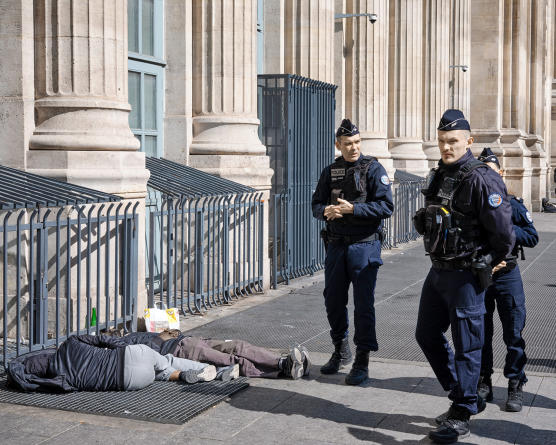The government began asking officials around the country to set up “temporary regional accommodation facilities” that could handle an outflux of homeless people.
The French government plans to move homeless people out of Paris ahead of the 2024 Olympic Games in the capital, sparking criticism from some mayors of regional towns and villages expected to house them.
From mid-March, the government began asking officials around France to set up “temporary regional accommodation facilities” that could handle an outflux of homeless people from the capital, many of them are migrants.
Olivier Klein, France’s junior housing minister, told lawmakers earlier this month changes were necessary because of an expected accommodation crunch in Paris during the rugby World Cup from September this year and the Olympics in July and August 2024.
Many low-end hotels that authorities use to provide emergency accommodation to homeless people plan to rent their rooms at market rates to sports fans and holidaymakers.
The government estimates that hotel capacity available to accommodate the homeless “will fall by 3,000-4,000 places due to these events,” Klein told MPs on May 5.
The expected fall “obliges us to ask questions and prepare for the situation… It’s about opening accommodation spaces in provincial areas for people who require emergency accommodation.”
But some of the proposed locations are already triggering alarm among local elected figures.
Philippe Salmon, the mayor of Bruz in northwest Brittany, voiced his opposition on Tuesday to the idea of a new center in his town, whose population is estimated at 18,000. “We are not in favor of creating a facility in our area, in conditions that we consider unacceptable,” he said.
The proposed site was next to a railway line and “polluted by hydrocarbons and heavy metals,” he said.
‘Putting people on buses’
Pascal Brice, the head of the Fédération des acteurs de la solidarité (Federation for Solidarity Workers), a homelessness charity, said that “putting people up in good conditions all over France rather than in the streets of the Paris region is positive in principle.”
“But will they put in the necessary resources?” Brice said there was a danger of “putting people on buses,” and failing to look after them.
Authorities in China cleared an unknown number of beggars, hawkers and homeless from the streets of China before the 2008 Beijing Olympics, with many shipped back to their home regions, reports said.
Brazilian campaign groups also said Rio de Janeiro’s homeless were being forced out of tourist areas in the middle of the night as the city hosted the games in 2016.
The French initiative to create emergency housing capacity in small towns around the country fits a pattern under French President Emmanuel Macron of trying to disperse migrants and others requiring social support from the densely populated Paris region.
Efforts to create housing facilities for asylum seekers outside Paris have proved an explosive issue, sparking fierce resistance from some local people, far-right activists and mayors.
A French mayor who supported a migrant center in his area of northwest France had part of his house burned down in an arson attack, leading him to resign earlier this month.
Klein said the fight against homelessness was “a priority” of the president and that funds allotted to solving the problem had “increased fivefold between 2012 and 2022.”
After coming to power in 2017, Macron had given himself until the end of that year to end rough sleeping once and for all. He later admitted that he had failed, citing an influx of migrants from Africa and South Asia as the reason.
Many of Paris’s bridges and parks are used for shelter by the homeless, with camps and tents regularly cleared away by security forces.
Source: lemonde















